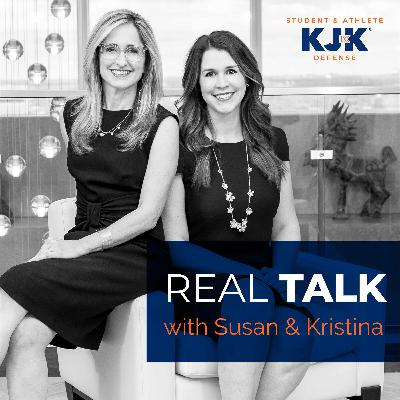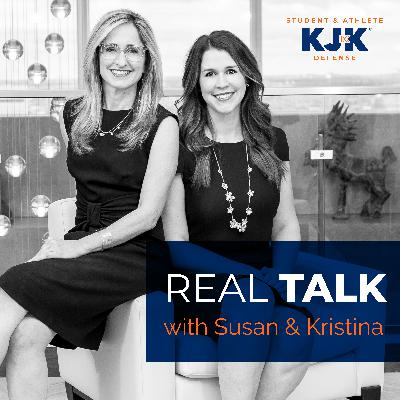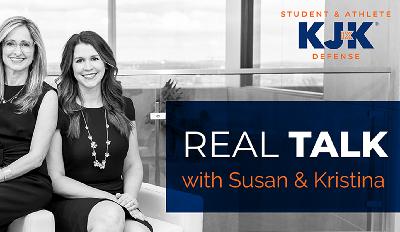Adoption: Understanding the Dynamic between Birth Parents, Adoptive Parents, and the Child
Description
In this episode of Real Talk, KJK Student Defense Attorneys Susan Stone and Kristina Supler are joined by Becca Gruenspan of RG Adoption Consulting. In this episode, topics include the myths around adoption, how adoptive parents can improve their chances of a successful adoption, and the competing emotions between birth parents, adoptive parents, and the adopted child.
Links:
RG Adoption Consulting: https://rgadoptionconsulting.com/
Show Notes:
(02:40 ) How One Adoption Lead to a Purpose-Filled Mission
(06:39 ) Why Becca focuses on domestic adoptions
(08:47 ) Greatest Fear: Will the Birth Mother Show Up Again?
(11:03 ) Adoption Roadmap: the Proprietary Process to Help Adopting Parents
(13:54 ) Details Matter: What is Important to the Birth Mother
(15:16 ) How RG Adoptive Consulting Helps Improve the Chances of Success
(17:36 ) What Some of the Difficult Obstacles are for Adoptive Parents
(19:31 ) Addiction: How Babies Fare When Born Addicted to Drugs
(21:26 ) Competing Emotions: What Birth Parents and Adoptive Parents Feel
(24:43 ) What Adoptive Children Struggle with Emotionally
Transcript:
Susan Stone: We're gonna talk about adoption today. And the reason we're gonna talk about adoption is that in our special education practice, we've represented a number of families of adopted kids, and the unique issues that children or students who are adopted had such as, attachment issues.
Kristina Supler: I'm really excited about today's episode. Because Susan Adoption's something that, you and I have no direct personal experience with. But it's an issue that comes up so often in our cases. And we regularly see the issues that adopted children's often experience in schools. And then the issues that the PA parents and families navigate through as well.
Susan Stone: I agree. And at this point I think I've worked on close to 50 to a hundred cases where there has been a student with an issue that is direct, directly related to the fact of the adoption status. But again, by the time you come to our office, it's because there is a need or a crisis or an issue that needs to be worked out.
I hate the fact that I never get to hear the success stories.
Kristina Supler: I know. I'm excited for today's guests to, to learn more about the adoption process, some of the challenges, but then also the good things and the success. Because you're right, Susan, we don't often hear about that so
Susan Stone: We never, I just wanna remind you, remember I always say we only get to see the dark side of life sometimes.
It's great to see when things go swimmingly well.
Kristina Supler: With that, let's welcome our guest today. We are joined by Rebecca Gruenspan. And Becky is a single mom who herself has gone through open adoption. She founded RG Adoption Consulting shortly after adopting her son in 2011. And we're so happy to have you with us today.
Susan Stone: And do you go by Becky, Rebecca.
Becca Gruenspan: Becca.
Susan Stone: Thank you. Okay,
Kristina Supler: Becca, tell us a little bit about your role as the Founder and CEO of RG Adoption Consulting.
Becca Gruenspan: Thanks for having me today. I started my business, we're about to be celebrating our 10 year anniversary. Um, wow.
Susan Stone: A decade.
Becca Gruenspan: Yes, we're very excited.
I started it two years after I adopted my son as a single woman, at the time who had gone through years of infertility and just really knew I was meant to be a mom. And I really wanted to be a mom. So I sought out first on the fertility path. And after that I failed, for lack of a better word.
I thought about adoption. But it really scared me probably for all the reasons you said you don't hear the good side. I was scared 'cause that was all I knew to, as well as all the stories I put into my head about what it meant to have to, to adopt. And then I was put in touch with, and it was also very overwhelming having gone through so much loss already. And long story short, I was put in touch with an adoption consultant. And I was told that this consultant was gonna hold my hand, tell me what to do, and how to do it and where to go and what to read and what not to read. And I was like, okay, I could use an easy button I'm around about now. And nine months to the day that I first called my consultant, I had my son in my arms.
Susan Stone: So it was a great experience using a consultant. Correct?
Becca Gruenspan: It was. Interestingly, I was told because I was in my forties and single and Jewish, that it was gonna be really hard for me. But voila, nine months later, I adopted.
So it was a very, great experience. Also scary. And I knew that, after I adopted my son, I wanted to help other people and I became this magnet to people who wanted to adopt. And I was very, passionate about the fact that they really needed help going through this. Because you don't know what you don't know.
Sure. Long short, two years later, I became an a consultant myself. And I thought, gosh, I'm putting all this money into my consultant that I use Pocket. I think I can do this now. I. and so that's when I started my business.
Susan Stone: Kristina. I had the privilege of actually going to yoga and having dinner with Becca. And I learned that Becca's not alone in this venture.
How many people work for your business?
Becca Gruenspan: Yeah, I think there, my team is seven or eight people right now. And we are all across the country. And we only work with the hopeful adoptive parent. We do not work with the birth mom or expectant mom. So that's really a distinct, a distinction between an adoption consultant and other entities such as a facilitator or an adoption agency.
We are not.
Susan Stone: So you are hired by the potential parents. And I just for clarification purposes, you only work on domestic, not international adoptions. Am I Correct?
Becca Gruenspan: You are correct.
Kristina Supler: Tell us why. But what's the difference between the two. Or why did you choose to just focus on domestic?
Becca Gruenspan: I can't even talk to you that much about the difference between the two because there is a big difference.
And so it's like you go down one path or the other, as well as like foster to adopt. That's a whole nother path as well. Each path has its own nuances, its own clearances, its own licensing. And it's done. Each is done very differently and is its own separate path, even though the end result is being an adoptive parent.
So I didn't know anything much about, international. I know just enough about all three routes that I just mentioned to talk about the pros and cons of each. But not enough to really guide someone through those, those paths.
Susan Stone: Certainly if you chose domestic and that's







